cityonfire.com | Movie News & Developments |
- How ‘Ip Man’ made Donnie Yen ‘The Man’
- First look at Byung-hun Lee and gang in ‘Magnificent Seven’
- Criterion adds ‘A Touch of Zen’ to their Blu-ray collection
- Steven Seagal to play an old-school lawman in ‘Gunfighter’
- Mermaid & Kung Fu Hustle | DVD (Sony Entertainment)
- Watch the new trailer for Oxide Pang’s action epic ‘My War’
- Ip Man Trilogy: Collector’s Steelbook | Blu-ray (Well Go USA)
- Deal on Fire! John Wick | Blu-ray | Only $9 – Expires soon!
- Lee Jung Jae races to save thousands of lives in ‘Tik Tok’
| How ‘Ip Man’ made Donnie Yen ‘The Man’ Posted: 19 Apr 2016 12:02 AM PDT
It's no secret that in many of Yen's early interviews, the person who had the biggest amount of faith in his abilities seemed to be himself. Treading the fine line between confidence and arrogance, for many Hong Kong cinema fans opinion was divided. While there was no doubt that onscreen he was a joy to watch, his outspoken opinions and tendency to openly criticise his co-stars did little to endear audiences to him as a person.
As his career progressed, it became clear that Yen's opinion of himself as a fight choreographer, was becoming just as important as his belief in himself as an action star. Yen's style of action direction eventually put him at odds with the man that discovered him, and things came to a head during the 1994 movie Wing Chun, which Woo Ping was directing and Yen was starring in. Unable to see eye to eye on how certain fight scenes should be choreographed, after production wrapped the decade long relationship between master and student was brought to an end. It would be over 20 years until they would reunite. While instances of falling out between cast and crew are not such a big deal in a film industry like Hollywood, in the tight knit Hong Kong action community of the 80's and 90's, it was quite the opposite. Word spread quickly that Yen was difficult to work with, and for the next 10 years he didn't headline a single Hong Kong action movie. However Yen wasn't one to simply fade away, and instead of embracing his fate as a fallen Hong Kong action star, he spent the rest of the 90's toiling away in low budget Philippines and Taiwan productions such as High Voltage, Iron Monkey 2, and City of Darkness.
While these movies allowed him to pay the bills, Yen took the opportunity to start developing his own distinctive action aesthetic. Amidst the low budget Hong Kong TV series in which he'd ape Bruce Lee, Yen stepped into the director's chair twice in the 90's. Making his debut with 1997's Legend of the Wolf, and following it up with Ballistic Kiss a year later, while both productions clearly show that Yen was still very much his own biggest fan, the action showed a promise which would be fully realised a few years later. As the 90's came to a close and the new millennium was rung in, Yen started to embrace the role of action choreographer more and more, working on a diverse range of projects. From a German TV pilot called Code Puma, to the Highlander sequel End Game, to Japanese sci-fi with The Princess Blade, to a role in Blade II. By the time it was 2002, Yen had built up enough of a respectable reputation that he gained a notable role in a highly anticipated Chinese production, his first since parting with Woo Ping 8 years prior. Although essentially an extended cameo, Yen's role as Sky in acclaimed director Zhang Yimou's Hero was a memorable one, thanks to providing him with a rematch against Jet Li. The pair had previously faced off against each other under the choreography of Woo Ping in Once Upon a Time in China 2, exactly 10 years earlier.
Hero was a significant hit, both in China and overseas, receiving the most amount of attention lavished on an Asian production since Crouching Tiger, Hidden Dragon made 3 years prior. However only a year later, an Asian action movie well and truly broke into the international market like no other, and it wasn't a Chinese or Hong Kong movie. It was Thai. Ong Bak became something of an international phenomena, starring a completely unknown Thai actor named Tony Jaa, it was the type of movie that even the people you know who didn't have the slightest interest in Asian movies had seen. Jaa became an overnight sensation, as an audience who previously had no interest in reading subtitles gushed about how "the guy knees him right through the floor!", "this dude runs on top of people's heads!", "he hits him so hard the motorcycle helmet breaks!" Ong Bak appealed to audiences on the most primitive level that action cinema should – it was visceral, hard hitting, and most of all, it was real. While Yen never openly said it out loud, it's easy to sense that he felt rather befuddled at this Thai sensation who appeared to come out of the blue. Yen had expressed his desire to break into Hollywood in several interviews, and here was Tony Jaa, proving that breaking into Hollywood wasn't necessary, with one movie everyone seemed to know his name already. A year after the release of Ong Bak, it was revealed that Yen had teamed with director Wilson Yip to make a Hong Kong action movie called Sha Po Lang. It would be the first time for him to headline a Hong Kong production since Wing Chun. In one of the interviews leading up to the movies release, Yen stated that the world had become focused on Thailand action cinema, and that it was time for him to put Hong Kong action cinema back on the map.
It may have been a throwaway statement, but it was a loaded one, one which basically said 'forget about Ong Bak…I'm back'. Truth be told, it wouldn't have taken too much to impress fans of Hong Kong action cinema in 2005. The industry had been going through an extended dry spell in terms of action movies, particularly martial arts based ones, so anything which managed to feature some decent punches or kicks being thrown would have been enough to get fans excited. Upon its release Sha Po Lang did indeed put Hong Kong action cinema back on the map. Yen's action direction in particular elevated it beyond the standard crime thriller that it would be otherwise, successfully infusing the back and forth flow of Hong Kong choreography with the new trend of MMA, both Yen's fights against Wu Jing and legend Sammo Hung are timeless classics. However did Sha Po Lang have the same international impact that Ong Bak did? Using this measurement as a level of its success, it certainly didn't. The reasons why are fairly obvious. Sha Po Lang is at its heart a crime thriller with a couple of standout fight scenes, and foreign audiences simply aren't that interested in going to see a subtitled crime thriller. Ong Bak was something more, its story was so simple that it hardly qualified as a movie, instead choosing to sell itself on one thing and one thing only – the action. Re-jigging the tagline that Jackie Chan used for Rumble in the Bronx, the marketing campaign for Ong Bak was all about Jaa having no stunt double and no wires, he was the real deal, a true action star. This simplicity, and the sheer audacity of the action scenes in Ong Bak, made pretty much everyone overlook its shortcomings, which were many. Sha Po Lang on the other hand wanted to be taken seriously, and for lovers of HK cinema it was, but it didn't have people who had never heard of Donnie Yen before suddenly proclaiming his name.
What couldn't be argued though, is that Yen was back on the Hong Kong cinema scene in a big way. After small parts in the likes of The Twins Effect 2, Sha Po Lang provided the foot in the door that he'd been looking for. A world away from the low budget productions of just a few years earlier, suddenly Yen found himself working with directors like Gordon Chan, on a re-make of King Hu's Painted Skin, and Tsui Hark on Seven Swords, in which he got to star alongside kung fu legend Lau Kar Leung. Thanks to the previously non-existent Mainland cinema going audience, Yen quickly became a hot commodity. Here was a guy who could be a leading man, and throw down in a way that the stars of yesteryear no longer could, which lead to articles being printed in Chinese media that declared him "The King of Action". Yen's real stroke of luck though was the successful working relationship he developed with director Wilson Yip. Like Yen, Yip had only had moderate success in his career so far, making forgettable fare such as the 2004 wuxia The White Dragon, and the 1998 horror comedy Bio Zombie. However paired with Yen, the duo of director and action director proved to be a winning one. After Sha Po Lang they went on to adapt a Chinese comic book with Dragon Tiger Gate in 2006, and another modern day crime thriller in the form of Flash Point, made a year later. However 2008 would prove to be the real turning point, and it was arguably one they probably didn't see coming. It was announced that Yip and Yen's next movie would be about Ip Man, the guy who up until this point was simply known in most circles as Bruce Lee's Wing Chun teacher. Most surprising of all was that Yen, who still had questionable acting skills and was mainly known for playing angry cops, would be the one stepping into Ip Man's shoes.
Everything about it seemed like an ill fit. The fans were clamouring for Yen to continue making modern day action movies like Sha Po Lang and Flash Point, and to confound things even further, it was widely known that Wong Kar Wai was also in the process of developing a movie about Ip Man, with Tony Leung taking the role. At the time it was the equivalent of learning that Steven Seagal was to make a movie playing Jake La Motta. It just didn't make sense. Then there was the other question, it was a Donnie Yen movie, so who was he going to fight? In recent years audiences had enjoyed him facing off against such talent as Wu Jing, Sammo Hung, Xing Yu, and Colin Chou. All certified martial artists, however Ip Man cast Hiroyuki Ikeuchi to be Yen's main opponent, a name which drew 1000 blank stares from the kung fu cinema loving community. However upon release something about Ip Man simply clicked. In a role reversal from Sha Po Lang, Sammo Hung took on choreography duties. The man behind what many consider to be the best Wing Chun movie of all time, The Prodigal Son, being in charge of choreographing Hong Kong's own prodigal son, would prove to be a winning formula. Gone were the classic Yen trademarks like the split flying kick and the wind-up punch, replaced by the close quarter intricacy of Wing Chun performed at an incredible speed. The action in Ip Man is arguably what helped it to break through not only in the local Chinese market, but on an international level as well. It may not have been released, in the US at least, until a couple of years after its initial screenings, however it quickly found an audience. Suddenly, just like Ong Bak, I found myself having conversations with my co-workers which had them declaring themselves as kung fu movie fans.
Upon prompting them to reveal what specific kung fu movies they liked, it often led to the same conversation – no one could remember the exact name of it, but they all explained that there was a scene were "the guy punches another guy right into the ground". The scene in question of course, takes place during what's still considered the best fight sequence of the series, which has Yen single handedly facing off against 10 karate experts. In the midst of the fight, Yen utilises an intense barrage of chain punches to literally pummel one opponent to the floor, where he continues to rain down blows into the face of his attacker in a relentless flurry of fists. That was it, that was the breakthrough. Just like Ong Bak had that 'moment', those few seconds that deliver something that's never been seen before – the scene of Tony Jaa double-kneeing someone straight through the floor – the chain punching scene in Ip Man was Donnie Yen's equivalent. The irony of course, is that it wasn't an enraged cop character delivering a flying foot to the face on the neon drenched streets of Hong Kong that made people finally recognise Yen, as I'm sure he was convinced it always would be, instead, it was a quiet and humble kung fu master. While it's easy to say that it was solely the action that made Ip Man a success, to a degree this would be short changing the other aspects of the production. Ip Man is simply a well put together movie, with a strong story and characters at its heart that anyone can easily relate to. The arrival of the Japanese forces in China provided Yen with an opportunity he'd rarely been given with the characters he'd played so far, which was a chance to really show his vulnerability. Against a brutal and oppressive military regime, the character of Ip Man wants nothing grander than to provide for his pregnant wife, and who isn't going to root for that guy?
Ip Man would be a pivotal role for Yen, one which saw him playing a different type of hero – gone was the brash and cocky super cop that audiences had become so familiar with, and almost expected Yen to play, and instead we were presented with a quietly spoken, mild mannered family man (albeit one who happened to be able to dish out some serious pain if the need arose). Yen himself also seemed to have lost that same brashness that was displayed in his earlier interviews, and in the press junkets to promote Ip Man came across as a confident and mature martial artist, whose passion around the science of screen fighting was both engaging and inspiring. If it was Sha Po Lang that gave Yen his foot in the door back into the world of Chinese cinema, then Ip Man saw him chain punching it off the hinges. Ip Man fever quickly took hold in China, rapidly transitioning from the man simply known as Bruce Lee's Wing Chun teacher, to a national icon overnight. Much like Wong Fei Hung, Ip Man became destined to become an almost mythical figure, impossible to tell fact apart from fiction. Soon there were TV series' focusing on Ip Man, there was a movie about Ip Man's younger years (Ip Man – The Legend is Born) that had Dennis To taking on the role, there was a movie about Ip Man's older years (Ip Man – Final Fight) that had Anthony Wong taking on the role, and the list goes on. When Wong Kar Wai's The Grandmaster finally came out in 2012, with Tony Leung, audiences were almost suffering from Ip Man fatigue.
But amongst all of the different variations and adaptions, it was the image of Donnie Yen which remained as the representation of Ip Man that stuck in people's minds the most. When it was announced that there was going to be a sequel to Yen and Yip's take on the master, it was major news. Director Yip and his king of action seemed to be putting together a cast of kung fu heaven – British powerhouse Darren Shahlavi, Venoms star Lo Meng, old school legend Fung Hak On, and there was even going to be a Sha Po Lang re-match of Yen vs Sammo Hung. Despite the cast though, Ip Man 2 was a decided let down after such a well told original instalment. In many ways, looking back now it could be said that Ip Man 2 buckled under the pressure of all the expectations it was burdened with. In the 2 short years since the first Ip Man, Yen had become one of the most bankable stars in China – the action crown was his – and there was nobody to take it away from him. The result was a sequel which shoved Ip Man's wife and friends well into the background, in favor of moulding the character into the hero of China, the one who would stand against the corrupt British forces and all those that dare to insult Chinese integrity. Gone was the vulnerability, and in its place was just an avatar for Chinese righteousness and honour. Ip Man was no longer someone we could relate to, weakly held up by a rather dull storyline of him trying to get established in Hong Kong amongst the other kung fu schools. Frankly, it just wasn't that interesting.
Shahlavi himself expressed his dissatisfaction with the character he played, a British boxer called Twister, shortly after its release, stating that he was repeatedly told to me be more OTT and aggressive, essentially turning him into a villainous caricature which was impossible to take seriously. The fight choreography, once again done by Sammo Hung, also had an abundance of issues, all of which come to the fore during a table top fight challenge between Yen and the masters of the other schools. Employing some bizarre wirework choices, even Sammo himself is apparently able to glide across the top of chairs like a sugarplum fairy, and perform flying kicks from a standing position, a stark contrast to the more grounded approach of the original. It was later revealed that Sammo was suffering from health problems during the production, which included a visit to hospital for a heart bypass, and wasn't performing at the peak of his abilities. Sadly the issues he was experiencing are reflected onscreen, and combined with a story which looked to capitalise on the character of Ip Man's new found popularity, the final product divided audiences down the middle. Most significantly though, were Donnie's own feelings about portraying Ip Man. The elephant in the room for the sequel had always been the Bruce Lee connection, and sure enough, Ip Man 2 closes out with a tagged on scene of a child actor playing Lee, visiting Ip Man to ask for Wing Chun lessons. Many fans speculated on if there would be a third instalment that would focus exclusively on the relationship between Ip Man and the Little Dragon, however it seemed unlikely. Notwithstanding permission issues from the Bruce Lee Estate, the thought of a whole movie based around Ip Man teaching Bruce Lee Wing Chun was hardly an exciting one, regardless of what the Bruce Lee fan base blindly wanted to believe. But more than any of these factors was the shock announcement that Yen made, declaring he would no longer be playing Ip Man for any future instalments.
Yen had stated he was of the belief that no more could be done with the character, and that the market was already saturated with Ip Man related TV series and movies, so it was time to move on to other pastures. As it happened, it turned out that Yen's decision to no longer play the role triggered the start of audiences' gradual loss of interest in Ip Man. Wong Kar Wai's The Grandmaster eventually found itself onto cinema screens in 2012, and Herman Yau cast Anthony Wong as the aging master in 2013's Ip Man – Final Fight, but neither of them generated the same excitement as a Yen starring Ip Man picture. Ip Man 2 also seemingly marked the end of the Wilson Yip and Donnie Yen collaborations, and despite rumors of them working together on a Wisely tale, another movie involving the director and star didn't appear to be on the cards. Despite Ip Man 2 not being on par with the original, it was still hugely successful in China, and only served to secure Yen's status as a local superstar. The general downturn in Ip Man mania was perhaps indicative that, it wasn't the character of Ip Man himself that was the sole driver behind the adaptations popularity, it was in fact the presence of Donnie Yen. In just two movies, much like Kwan Tak-Hing's name had become synonymous with Wong Fei Hung, Donnie Yen had become synonymous with Ip Man. In the wake of the sequel the number of productions Yen was involved in each year was almost off the charts, and all of them were big budget affairs. From the legendary General Guan in The Lost Bladesman, to the Shaw Brothers influenced 14 Blades and Wu Xia, taking on Yuen Biao's role in a remake of The Iceman Cometh, the mischievous Sun Wukong in The Monkey King, and returning to his angry cop roots in Special ID and Kung Fu Killer. From 2011 – 2014 Yen made appearances in a whopping 10 movies, you couldn't get away from him even if you wanted to.
Yen's popularity went from strength to strength, with the number of movies he was reported to be involved in far outweighing what any single person could possibly manage in reality. News formed of him creating his own production company, named Super Hero Films Co, which would kick off with two movies called The Master and Dragon City, both of which, at the time of writing, are not even close to getting started. Then there's the previously mentioned Wisely movie with Wilson Yip. Not to mention a Hollywood production, Noodle Man, which was to also star Robert De Niro and Al Pacino. To top it all off, Part 2 of the Iceman Cometh remake, Iceman 3D, has been in post production limbo for what seems like forever. However despite all of these false starts and rumors, one announcement got everyone's attention – 5 years on, 2015 would see Yen returning to the role of Ip Man for a third instalment. The news sent the internet abuzz with speculation and anticipation – can Yen still handle the physical demands of the role? Would Sammo Hung be returning as choreographer? Would it be about Ip Man's relationship with Bruce Lee? Who would be the antagonist? The news filtered through slowly but surely, with every piece of new information justifiably generating a lot of excitement. The fact that Yen would be re-teaming with Wilson Yip should have been big news in itself, but what was to become Ip Man 3 had a few cards up its sleeve that made their reunion seems like a minor detail. First up, it was revealed that Sammo Hung wouldn't be involved in the production, and that choreography duties would go to Yuen Woo Ping. This was a huge surprise, as it would mark the first time that Yen and Woo Ping had worked together since creative differences led to them parting ways after Wing Chun, over 20 years earlier.
Secondly was the inclusion of legendary boxer Mike Tyson as a member of the cast, with a confirmed confrontation to take place between him and Yen. To round things off, after much speculation (including one ridiculous rumor of a 100% CGI creation), it was confirmed that Shaolin Soccer goalkeeper Danny Chan would be stepping into the shoes of Bruce Lee. Ip Man, Mike Tyson, and Bruce Lee all in the same movie, the hype was going to be a lot to live up to. The third instalment finally arrived on cinema screens in late December 2015, and Yen made a very visible push to ensure it gained the same level of international recognition as the first, flying to the US and doing a promotional tour with Mike Tyson to get the word out there. The heavy promoting turned out to be a worthwhile exercise, as Ip Man 3 did in fact go a long way to putting right everything that was wrong with its predecessor. Gone was the image of Ip Man as the hero of China, and proceedings were dialled back to make him a relatable human again, as he deals with greedy property developers, and more significantly, his ill wife. Perhaps a sign of Yip and Yen's indifference to Ip Man's connection to Bruce Lee, just as Ip Man 2 closed out with a throwaway scene of the child Bruce Lee meeting him for the first time, Ip Man 3 opens with a throwaway scene of the young adult Bruce Lee meeting Ip Man again. Most glaringly, despite the character of Bruce Lee having aged around 10 years, Yen hardly looks a year older than he does in the previous installment.
If any more confirmation was needed, it's these closing and opening scenes which prove that Yip and Yen's Ip Man movies were no longer about portraying Ip Man the historical character, they were about Donnie Yen playing Ip Man. Out of all the installments, the third sees Yen at his most comfortable in the role, and despite a slightly meandering structure, the relationship with his wife resonates on an emotional level so well that you almost forget you're watching a kung fu movie. But a kung fu movie it is, and Woo Ping's take on Wing Chun choreography provided a breath of fresh air, succeeding in generating the excitement that was felt when watching the original for the first time. The fight with Tyson turned out to be an unexpected highlight, and a finale which pits Yen against Max Zhang, one of the brightest martial arts talents working in the industry, provides one of the purest kung fu showdowns in a movie that's been seen for a long time. In many ways Ip Man 3 went the direction of showing that less is more, a direction which even dared to throw in an extended segment of Yen not fighting at all, as he drops everything to look after his ailing wife in her time of need. It might not have a ruthless military regime to root against like the original, or the brash over the top action of the second, but Ip Man 3 succeeds in delivering a simple tale of a man who wanted to live peacefully and happily with his family. It's a story that resonates, and while it can easily be argued the tale has strayed way off the path of how Ip Man's life really played out, that's not really what movies are for. Yen ends Ip Man 3 sat down, cup of tea in hand, looking out of the window. It's a scene which both suitably closes out the tale of Ip Man, and proves that Donnie Yen was indeed the best man to do it. Ip Man 3 is now available on Blu-ray and DVD from Well Go USA Entertainment. Also be sure to read our interview with Ip Man 3 stars, Donnie Yen and Mike Tyson. |
| First look at Byung-hun Lee and gang in ‘Magnificent Seven’ Posted: 19 Apr 2016 12:00 AM PDT A remake of John Sturges 1960 classic, The Magnificent Seven, is currently underway by director Antoine Fuqua (The Equalizer). The film will be based off a script by John Lee Hancock (The Blind Side) and Nic Pizzolatto (True Detective). The remake is due in theaters on January 13, 2017. The original The Magnificent Seven (read our review) – a remake itself of Akira Kurosawa’s Seven Samurai - starred Yul Brynner, Steve McQueen, Charles Bronson, James Coburn, Robert Vaughn, Brad Dexter, and Horst Buchholz. The plot involved seven American gunmen who are hired to protect a small village in Mexico from a group of Mexican bandits. Fuqua brings his modern vision to a classic story. With the town of Rose Creek under the deadly control of industrialist Bartholomew Bogue (Peter Sarsgaard), the desperate townspeople employ protection from seven outlaws, bounty hunters, gamblers and hired guns – Sam Chisolm (Denzel Washington), Josh Farraday (Chris Pratt), Goodnight Robicheaux (Ethan Hawke), Jack Horne (Vincent D'Onofrio), Billy Rocks (Byung-Hun Lee of I Saw the Devil), Vasquez (Manuel Garcia-Rulfo), and Red Harvest (Martin Sensmeier). As they prepare the town for the violent showdown that they know is coming, these seven mercenaries find themselves fighting for more than money. Updates: Here’s the first photo of the entire gang of The Magnificent Seven. |
| Criterion adds ‘A Touch of Zen’ to their Blu-ray collection Posted: 18 Apr 2016 09:06 PM PDT Film aficionados’ (i.e. film snobs) favorite video-distribution company, The Criterion Collection, have announced a July 19th Blu-ray and DVD release for King Hu’s seminal wu xia classic, A Touch of Zen (1971). Here’s the official release information: "Visionary" barely begins to describe this masterpiece of Chinese cinema and martial arts moviemaking. A Touch of Zen by King Hu depicts the journey of Yang (Hsu Feng), a fugitive noblewoman who seeks refuge in a remote, and allegedly haunted, village. The sanctuary she finds with a shy scholar and two aides in disguise is shattered when a nefarious swordsman uncovers her identity, pitting the four against legions of blade-wielding opponents. At once a wuxia film, the tale of a spiritual quest, and a study in human nature, A Touch of Zen is an unparalleled work in Hu's formidable career and an epic of the highest order, characterized by breathtaking action choreography, stunning widescreen landscapes, and innovative editing.
Stay tuned for pre-order information. For now, watch the trailer! |
| Steven Seagal to play an old-school lawman in ‘Gunfighter’ Posted: 18 Apr 2016 08:00 PM PDT 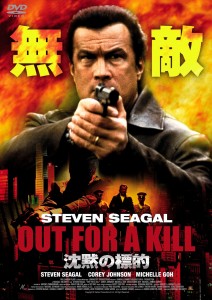 "Out for a Kill" Japanese DVD Cover Another Steven Seagal (Above the Law, Out for a Kill) movie has just been added to the action star’s evergrowing filmography. Just a week after the announcement of Attrition – Seagal’s first directorial project in 22 years – new information has surfaced about Seagal starring in Gunfighter. According to VMI, Gunfighter centers on an old-school lawman who battles a ruthless, deadly gang that has invaded his small town to pull off a brazen daylight heist. Chuck Hustmyre, who wrote the yet-to-be-released Seagal film, End of a Gun, will also write Gunfighter. There are currently no others stars or a director attached. As a side note, Gunfighter sounds slightly similar to 2013′s The Last Stand – the Hollywood debut feature of Kim Ji-woon (I Saw the Devil) – which starred Arnold Schwarzenegger as a small town sheriff who protects his town from a dangerous drug lord. Other Seagal films “in the works” include Attrition, Contract to Kill, End of a Gun, Cypher, Four Towers and Under Siege 3. Seagal can be seen next in one of the following, forthcoming titles: The Asian Connection, Killing Salazar, Perfect Weapon and Code of Honor. Stay tuned for more news regarding Gunfighter. |
| Mermaid & Kung Fu Hustle | DVD (Sony Entertainment) Posted: 18 Apr 2016 07:00 PM PDT 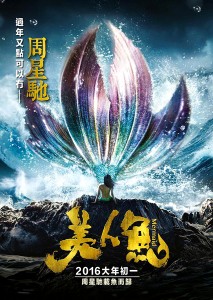 "The Mermaid" Chinese Theatrical Poster RELEASE DATE: July 5, 2016 Sony Entertainment presents the DVD for Stephen Chow’s 2016 The Mermaid and 2004′s Kung Fu Hustle. The Mermaid stars Deng Chao (Jian Bing Man), Lin Yun (L.O.R.D), Show Luo (Journey to the West), Zhang Yuqi (CJ7) and Kris Wu (xXx: The Return of Xander Cage). Kung Fu Hustle stars Chow (Shaolin Soccer), Yuen Wah (Kick Boxer), Yuen Qiu (Man with the Golden Gun), Bruce Leung (Invincible Eight) and Danny Chan (Ip Man 3). Pre-order the DVD for Mermaid & Kung Fu Hustle today. |
| Watch the new trailer for Oxide Pang’s action epic ‘My War’ Posted: 18 Apr 2016 03:57 PM PDT Oxide Pang (Bangkok Haunted), 1/2 of the directing duo known as The Pang Brothers (The Eye, The Eye 2), is back with My War, an epic blockbuster starring Liu Ye (The Last Supper), Wang Luodan (Rise of the Legend) and Tony Yang (Phantom of the Theatre). According to sources, My War tells of the romance and friendship among a group of soldiers who fought in the Chinese People’s Volunteer Army (CPVA) in the early 1950s, during the Korean War. My War hits Chinese theaters on September 30, 2016. Until then, don’t miss the film’s trailer (via AFS). |
| Ip Man Trilogy: Collector’s Steelbook | Blu-ray (Well Go USA) Posted: 18 Apr 2016 02:00 PM PDT RELEASE DATE: May 17, 2016 One Great Man. One Inspiring Story. And now, one quintessential collection: The Ip Man Trilogy. This Special Edition Steelbook, featuring the iconic vision of director Wilson Yip and starring the incomparable Donnie Yen as Ip Man, will hits Amazon on May 17, 2016. The Ip Man Trilogy contains the following films: Ip Man (2008) Set in Foshan, China during the Sino-Japanese War, an infamous Japanese occupation has brutally dismantled the once-great city. Proud men have been laid low, reduced to fighting their neighbors to the death for a precious bag of rice. Defined by courage and devoted to peace, one man stands for his people: Grandmaster Ip Man (Donnie Yen), whose matchless fighting skills are revered all over China. He refuses to teach Wing Chun, his cherished martial arts style, to the invading Japanese soldiers, and is forced to fight for the honor of his country in a series of battles that culminate in a kill-or-be-killed showdown with General Miura (Hiroyuki Ikeuchi), Japan’s greatest fighter. Ip Man 2 (2010) International superstar Donnie Yen reprises his role as real-life kung fu Grandmaster Ip Man, now a newly-arrived citizen in British-occupied Hong Kong. Master Ip wishes to open a Wing Chun academy to teach his unique style to a generation of new students, but is blocked by a corrupt group of martial arts masters led by Master Hung (Sammo Hung). They refuse to allow him to teach in peace until he proves himself as a kung fu master. His trouble continues when he s forced to enter a savage King of the Ring boxing match against Twister (Darren Shahlavi), a Western-style boxer who insults the Chinese locals, in a East-versus-West fight to the finish. Ip Man 3 (2015) Igniting the screen in the role that made him an icon, Donnie returns to the blockbuster martial arts series as Ip Man, the real-life Wing Chun grandmaster who mentored countless students, including several martial arts masters and action star Bruce Lee. When a ruthless real estate developer (Mike Tyson) and his team of brutal gangsters make a play to take over the city, Master Ip is forced to take a stand against the crooks, thugs, gunmen, and another rival Wing Chun master (Jin Zhang) to protect his students, his city, and his own family. Fists will fly as some of the most incredible fight scenes ever filmed, choreographed by the legendary Yuen Woo Ping, come to life in this genre classic. Pre-order The Ip Man Trilogy from Amazon.com today! |
| Deal on Fire! John Wick | Blu-ray | Only $9 – Expires soon! Posted: 18 Apr 2016 12:01 AM PDT Today’s Deal on Fire is the Blu-ray for David Leitch and Chad Stahelski’s John Wick (read our review), starring Keanu Reeves. Reeves plays John Wick, an infamous, retired assassin who now leads a peaceful lifestyle. But when a series of unfortunate events distort his daily routine, Wick has no choice but to revisit his sinister past and go on one hell of a kill crazy rampage. The Blu-ray for John Wick includes the follow extras: Audio Commentary, Featurettes: Don’t F^#% with John Wick, Calling in the Calvalry, Destiny of A Collective, Assassin’s Code, Red Circle and NYC Noir. Order John Wick from Amazon.com today! |
| Lee Jung Jae races to save thousands of lives in ‘Tik Tok’ Posted: 18 Apr 2016 12:00 AM PDT Get ready to see Lee Jung Jae (Big Match, Assassination) race against the clock to save thousands of lives in Tik Tok, a Li Jun-directed Korean/Chinese thriller that also stars Wallace Chung (Drug Wars). According to FCS, Tik Tok pits a cop against suspect in the wake of a bombing during a soccer game between China and South Korea. Judging from the trailer, Tik Tok has all the ingredients of a summer blockbuster: suspense, martial arts action, shoot-outs, explosions and a Sudden Death-like arena setting. Tik Tok releases in theaters on July 15, 2016. |
| You are subscribed to email updates from cityonfire.com | Movie News & Developments. To stop receiving these emails, you may unsubscribe now. | Email delivery powered by Google |
| Google Inc., 1600 Amphitheatre Parkway, Mountain View, CA 94043, United States | |

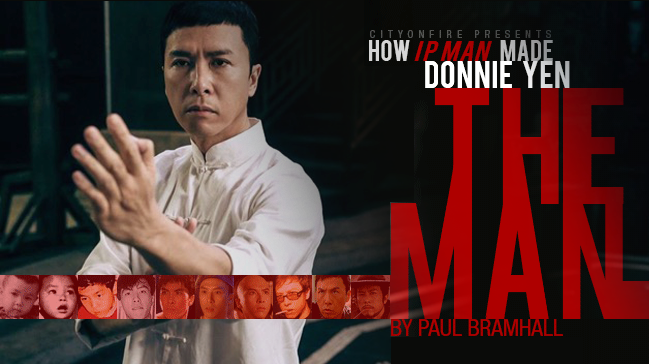 Donnie Yen's career in the film industry has been one that's certainly been more interesting than most. Discovered by Yuen Woo Ping, his debut as the lead in 1984's Drunken Tai Chi for many represents the last movie of the old-school era. Yen's performance left little doubt that there was a major new talent on the scene, and his ongoing collaborations with Woo Ping produced a steady stream of Hong Kong classics –
Donnie Yen's career in the film industry has been one that's certainly been more interesting than most. Discovered by Yuen Woo Ping, his debut as the lead in 1984's Drunken Tai Chi for many represents the last movie of the old-school era. Yen's performance left little doubt that there was a major new talent on the scene, and his ongoing collaborations with Woo Ping produced a steady stream of Hong Kong classics – 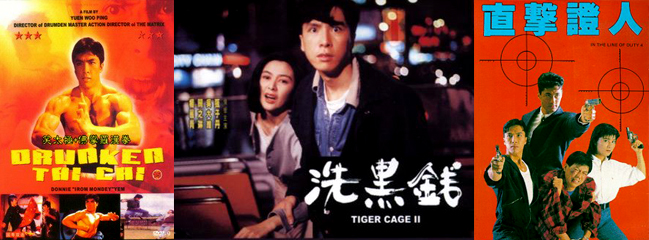
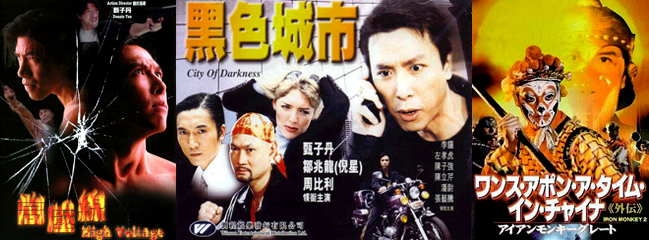
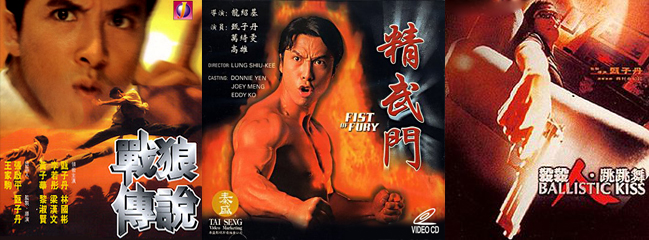
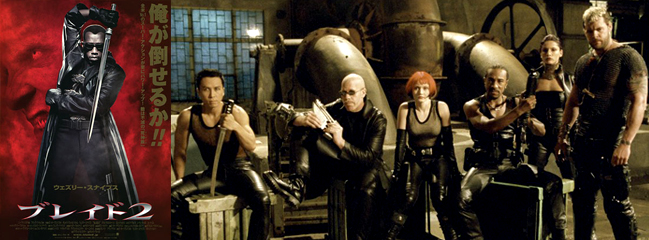
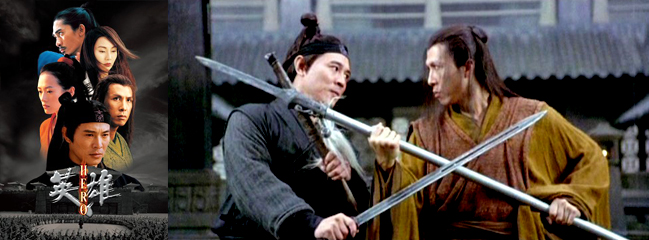
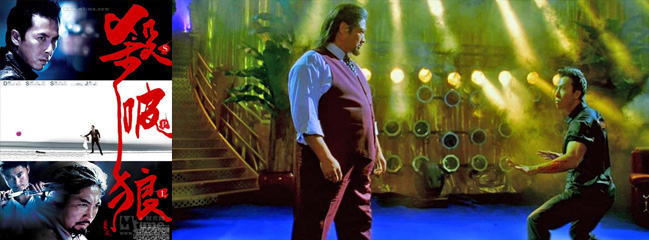
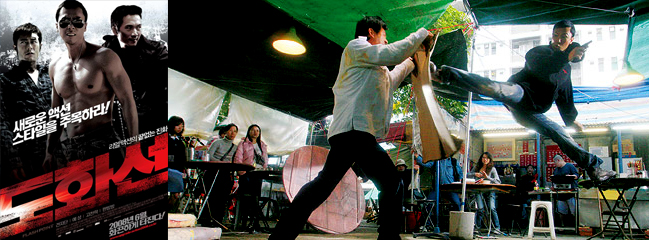
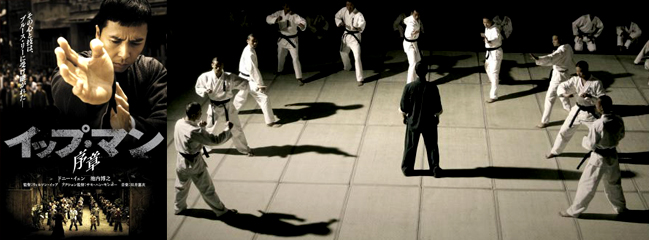
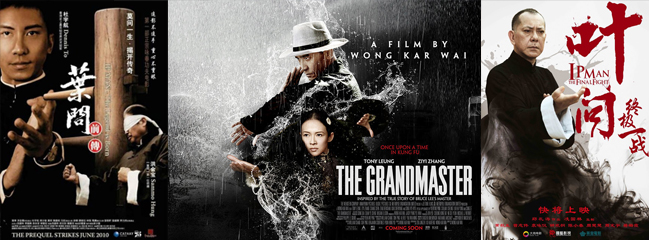
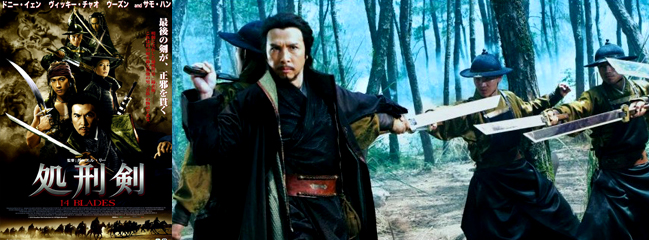
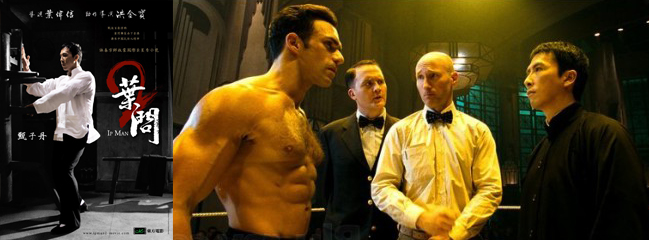
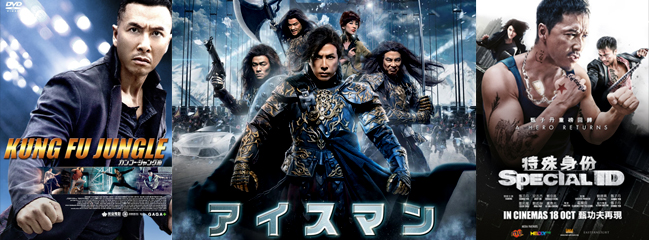
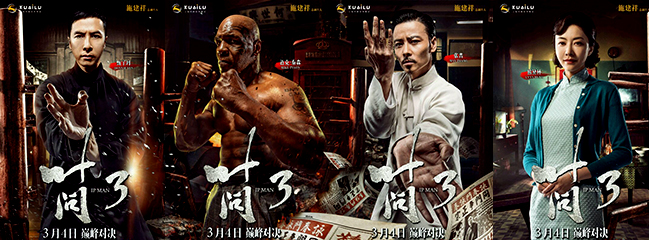
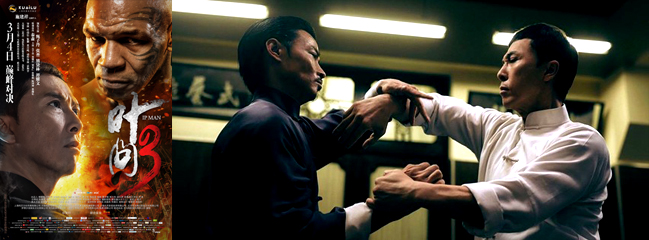

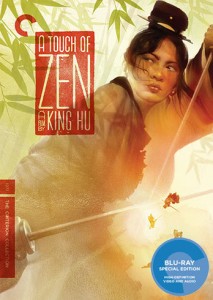
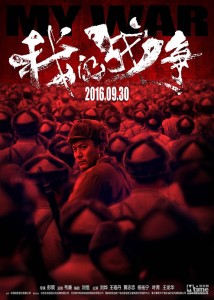
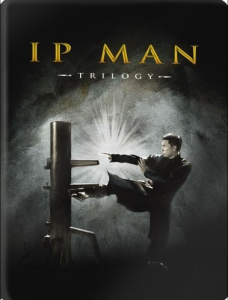

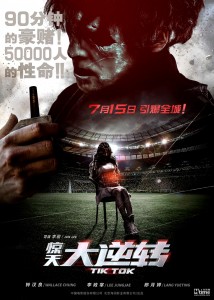
No comments:
Post a Comment